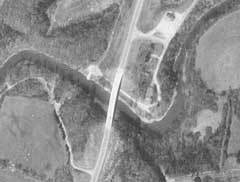Jonathan D. Hale and Hale’s Mill, Pickett County

This is a picture of where we believe that the Mill was situated. The picture was taken standing on the Wolf River Bridge on Highway 111 looking down stream.

This is an aerial view of Highway 111 crossing the Wolf River. It is believed that the ford to cross the river is to the left of the present day bridge. The dam and Grist mill would have been up river to the right of the ford.
In October, 1845, Jonathan D. Hale and John F. Jouett petitioned the General Assembly of Tennessee, as citizens of the counties of Fentress and Overton, that they desired to erect a grist and saw mill, and other valuable machinery on Wolf River, at a place known as the Huddleston Place. Their opinion was that it would be of great public utility and that the navigation of said stream would not be injured.Jonathan Hale established a mill and a store and was postmaster at Hale’s Mill. The post office was established around 1850; the mill was located just below the present bridge on Highway 111 on Wolf River at the mouth of Ford Branch.
Hale was a native of New Hampshire, and a strong Union man in the Civil War. After John “Jackie” Zachary hid in the bluff overlooking the road and killed Lafayette Allen, a C.S.A. Soldier, the Confederate guerillas burned the mill. After the mill was burned, J.D. Hale moved his family to Clinton and Adair Counties in Kentucky, bur returned to Tennessee after the war. The above text was based on “History of Pickett County, Tennessee” 1973. The Hale family owned the place until about 1900, when they sold it to J.M. Flowers. It was then known as the Asberry Farm.
Champ Ferguson “aquired” a piano from Dr. Hale. With a team of oxen it was shipped over the rough terrain from Byrdstown to Ferguson’s new home along the Calfkiller River in White County, where he reportedly sold it for $200.
Both Dr. and Mrs. Hale testified at the trial of Champ Ferguson in Nashville.
Hale’s Mill Cemetery, also known as the Hale Cemetery, is located across from the J.C. Asberry house [on old 42]. There are 12 to 15 graves with fieldstones as markers or are unmarked. It is not known if J.D. Hale is buried here, but his widow, Ferby, 2 blacks, 1 female born in KY, 1 male born in TN, along with 5 others were listed in the 1870 Fentress County, TN, census. Taken from the book Gone But Not Quite Forgotten, by Richard Pierce.
This is an excerpt from The Patriots and Guerillas of East Tennessee and Kentucky: The Sufferings of the Patriots also the Experience of the Author as an Officer in the Union Army Including Sketches of Noted Guerillas and Distinguished Patriots, by Major J. A. Brents:
J. D. HALE
I will say nothing further of those well known to the nation, but will give brief sketches of a few characters who are not so well known—not so influential, yet as patriotic. J. D. Hale is a native of New Hampshire, but has resided for several years past in the northeastern part of Overton county, Tennessee, near the Kentucky line.
He is about forty years old—five feet nine inches high; has sandy hair and whiskers, rather stooped or round shoulders, and a gray eye. He has a long and rather narrow head, and is heavy built; is quite energetic and industrious, and has accumulated some property. He owned a farm and a good water-mill; kept an assortment of farmers’ tools for sale; was a mechanic, and, like all other Yankees, was quite useful as a citizen. He had acquired considerable influence—was firm and decided, sober, and of steady habits.
He was among the first to denounce and expose secession. The Union never had a warmer and firmer advocate, and for it he was willing and ready to do anything in his power. In the spring of 1861, the Tennessee Legislature passed an ordinance of secession, and submitted it to a vote of the people; but, without awaiting the result of the vote, formed a league with Jeff. Davis’ Government, and authorized the Governor to raise fifty-five thousand troops. He immediately commenced operations; raised a considerable force, armed them, and placed them in different parts of the State, so as to control the election. Troops were sent into Tennessee from other southern States.
Such men as John Bell and Andrew Ewing submitted, and advocated secession; such as Andrew Johnson and Horace Maynard stood firm. They made speeches wherever they could, and canvassed East Tennessee, but were not permitted to visit Middle and West Tennessee; Union men were not permitted to talk in those divisions of the State. In East Tennessee their friends protected them, and they talked in spite of all opposition. It was, however, with great personal danger; they were threatened wherever they went.
Hale protected the friends of the Union, regardless of personal danger. Hon. Horace Maynard had an appointment to speak at Livingston, Overton county, Tenn. A large audience was in attendance. Maynard attempted to speak, but was prevented by the secession leaders. Just as he commenced, a committee of leading secessionists appeared in the court house, and informed him that a meeting had been in session, and had resolved that he should not speak. He told them that Judge Gill and other prominent men were present, and could reply, and if he was wrong, they could certainly expose his false positions; and that not criminal had ever been denied a hearing in the State of Tennessee. They said that “the day for discussion had passed.” (This was before the people had voted upon the ordinance of secession.) He suggested that if he was wrong, no harm would result to an intelligent people. They replied, that his eloquence was too persuasive—that he might as well desist, as they had determined he should not speak.
He saw that it would be useless to make the effort, and desisted; but announced that he would speak at Monroe, the next day—a small town, about six miles from Livingston. The secessionists declared that he should not speak; that they would be present with the militia; and, if he attempted to speak, they would disperse the meeting.
Hale was present and heard their threats, and immediately went to work and collected between three and four hundred Union citizens, who were armed with squirrel rifles and shot guns. They raised the stars and stripes, the banner of liberty, and marched in a body to Monroe, determined to defend, as long as life lasted, that banner, free speech, and the Union. Such was the resolve of true, determined patriots.
Maynard spoke to a large audience without interruption. With burning eloquence he exposed the frauds and designs of the secessionists, and held up to his spell-bound audience the sacredness of the Union cause. Burning tears rolled down the cheeks of old, gray-headed fathers. Young men took a vow never to forsake the cause of the Union; and well have they kept that vow. At the conclusion of the speech, the audience gave three tremendous cheers for the Union, and then dispersed. Hale accompanied Maynard to Travisville, Fentress county, the next day, where he made another eloquent speech to a large audience.
Such were the trials and difficulties of the Union men in Tennessee. None but the brave stood firm. Hale was determined that the cause of the Union should be defended in his part of the State, at all hazards. If Union men everywhere had followed this noble example, the evil consequences of secession and rebellion would not have been experienced. It required resolution and determination to meet such a crisis.
Hale, by his unceasing exertions for the Union, became known throughout the State of Tennessee. He was threatened in the secession prints, and by secession orators; was hated by them, and denounced as a “Yankee.” He was told that he had no right to say anything; yet he did talk. It was mainly by his exertions that the people of the northeastern portion of Overton and the whole of Fentress county voted almost unanimously for the Union.
The secessionists said that if it had not been for Hale, these people would have remained loyal to the South, and that they intended to hang him. He was hunted and watched by them. He was compelled to leave his home, and conceal himself among the rocks of Wolf river hills, and was finally forced to leave the State. At the hour of midnight he loaded his wagons with a portion of his personal effects, and, with his family, made his escape to Albany, Ky., as he could not with safety travel the public highway in daylight.
He did not cease his labors, but assisted Union men to escape from Tennessee, and forwarded them to Camp Dick Robinson. His son, aged about sixteen, was captured and held as a prisoner. After a few months his family were followed to Albany. His negro man and horses were driven off, and other property taken. They were again compelled to flee; and crossing the Cumberland river, stopped in Adair County, Ky.
He continued to correspond with the East Tennesseeans, assisting many of them in escaping from their persecutors, and rendered good service toward organizing the Tennessee troops. His labors were unceasing. Having an iron will and constitution, he suffered and endured. He rendered very important services, such as few would dare undertake, and which have been acknowledged by General George H. Thomas, and other military men in the West.
In the last conversation I had with Hale, he remarked that he had suffered much, and could endure more; that he would never desert the Union. Although he was the owner of slaves, he thought more or his country than of them, and did not consider any man patriotic that thought otherwise, however loud his professions for the Union. He further remarked, “The Union citizens of Overton and Fentress counties have stood by me when the rebels were hunting for my life, and by faith I will stand by them. I will never desert them.”
Source: http://www.theborderlands.org/HalesMill.htm (via the Internet Archive)
